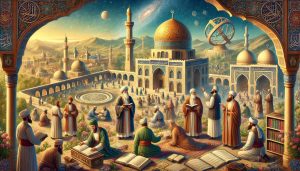The Role of Muslim Scholars in Building Islamic Civilization

By Dr. Abdul Wadud Nafis, LC., MEI
Muslim scholars have a strategic role in building an Islamic civilization that is not only rooted in Islamic values but also capable of addressing the challenges of the times. They serve as intellectual, spiritual, and social pillars who drive change, guide policies, and foster harmony amidst the dynamics of society. Through their roles, Islamic civilization holds the potential to continue flourishing as a mercy for all creation. Below are the primary roles of Muslim scholars in realizing this vision:
1. Leaders in Thought and Knowledge
Muslim scholars play a crucial role in advancing knowledge by integrating divine revelation (naqli) and reason (aqli). They explore the classical Islamic intellectual tradition, including fields such as philosophy, medicine, astronomy, and science, to meet contemporary challenges. Additionally, they preserve the intellectual heritage of great figures like Ibn Sina, Al-Farabi, and Al-Ghazali to ensure its relevance and benefit for the Muslim community.
2. Builders of Spiritual Civilization
In the spiritual realm, Muslim scholars exemplify noble character and disseminate ethical and moral values based on Islamic teachings. They also act as guardians of unity within the Muslim community by promoting Islamic brotherhood (ukhuwah Islamiyah), human brotherhood (ukhuwah insaniyah), and national brotherhood (ukhuwah wathaniyah).
3. Contributors to Public Policy
Muslim scholars contribute to shaping public policy by advocating for principles of justice, welfare, and public benefit. They engage in addressing issues important to the Muslim community, such as Islamic-based education, sharia-compliant economics, and equitable access to healthcare for all social strata.
4. Agents of Social Transformation
In the social sphere, Muslim scholars empower communities through education and guidance that encourage independence and innovation. They also enhance Islamic literacy within society by promoting critical thinking through writings, lectures, and public discussions.
5. Balancers in the Era of Globalization
In the age of globalization, Muslim scholars assist the Muslim community in preserving their Islamic identity by interpreting religious teachings in a contextual and relevant manner. They play a role on the international stage, demonstrating that Islam offers solutions to modern challenges such as environmental issues, social justice, and global peace.
6. Pioneers in Economic and Technological Innovation
In economics, Muslim scholars develop sharia-based economic concepts that emphasize justice and collective welfare. They also contribute to technological innovation aligned with Islamic values, promoting sustainability and enhancing the global competitiveness of the Muslim community.
By embracing these roles, Muslim scholars are not only leaders of the Muslim community but also drivers of change, supporting the realization of an Islamic civilization that is just, progressive, and dignified.
Conclusion
Muslim scholars are agents of change who carry the grand vision of Islamic civilization: building a world that is just, honorable, and prosperous. With their intellectual integrity, spirituality, and social concern, they are not just lights for the Muslim community but also bearers of hope for a brighter future.
References :
1. Al-Attas, S. M. N. (1995). Prolegomena to the Metaphysics of Islam: An Exposition of the Fundamental Elements of the Worldview of Islam. Kuala Lumpur: ISTAC.
2. Al-Faruqi, I. R. (1982). Islamization of Knowledge: General Principles and Work Plan. Washington D.C.: International Institute of Islamic Thought (IIIT).
3. Al-Ghazali. (1997). Ihya’ Ulum al-Din (Revival of Religious Sciences). Beirut: Dar al-Kotob al-Ilmiyah.
4. Nasr, S. H. (1987). Science and Civilization in Islam. Cambridge: Harvard University Press.
5. Rahman, F. (1982). Islam and Modernity: Transformation of an Intellectual Tradition. Chicago: University of Chicago Press.
6. Yusuf al-Qaradawi. (1995). Priorities of the Islamic Movement in the Coming Phase. Beirut: Al-Maktab al-Islami.

